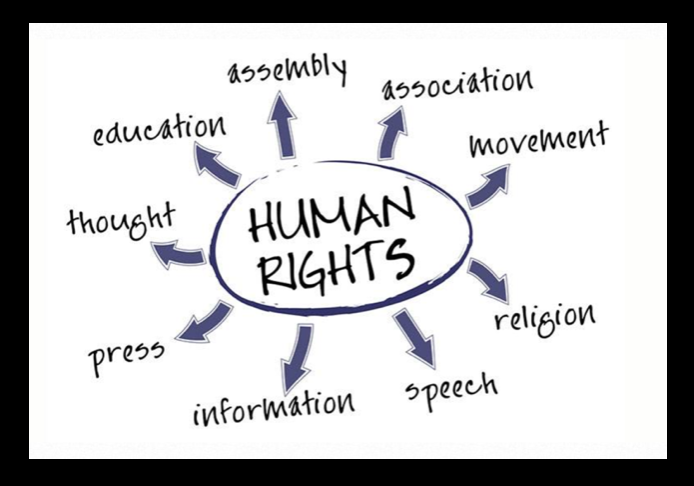I am an extremely strong proponent of progressive values. This includes my long-time support of all Internationally Recognized Human Rights, including The Medical Ethic of Informed Consent.
Over the past twenty years, I have found that most people do not have a solid sense of what constitute our globally recognized Human Rights. Just for fun, go ahead and ask yourself, “what are my inalienable Human Rights, how did they come to be codified into law, what triggered their creation, when did this happen, and what political entities acknowledged them, on behalf of all of humanity?” Even I don’t have all of the answers to these questions! Do you?
So, let’s take a minute to review some basics.
To read up on the whole shebang, go here: The History of Human Rights
And, to get a small sense of what is covered at the above website, here is Article 3:
Article 3, the first cornerstone of the Declaration, proclaims the right to life, liberty and security of person -a right essential to the enjoyment of all other rights. This article introduces articles 4 to 21, in which other civil and political rights are set out, including: freedom from slavery and servitude; freedom from torture and cruel, inhuman or degrading treatment or punishment; the right to recognition everywhere as a person before the law; the right to an effective judicial remedy; freedom from arbitrary arrest, detention or exile; the right to a fair trial and public hearing by an independent and impartial tribunal; the right to be presumed innocent until proved guilty; freedom from arbitrary interference with privacy, family, home or correspondence; freedom of movement and residence; the right of asylum; the right to a nationality; the right to marry and to found a family; the right to own property; freedom of thought, conscience and religion; freedom of opinion and expression; the right to peaceful assembly and association; and the right to take part in the government of one’s country and to equal access to public service in one’s country. [This is one of many Articles.]
When Americans talk about living in a “litigious” culture, they often mean it as a criticism. This is unfortunate. While our legal system is not perfect, it is absolutely brilliant in one specific way: our system of written laws is pure memory. Why does this matter? Simple. Laws are often a society’s reaction to injustice, and each judgement includes a description of the story which brought the issue to the awareness of the courts. Through the law, we learn not simply what is or is not legal or ethical today…but how we came to that conclusion. In other words, who suffered so greatly that we changed the law as a result?
In America, law regulates almost everything, right? This includes the laws which, based upon centuries of human thought, inform eager scientists and medical practitioners of what they can, and must never, do. To fill in a few more common gaps in what people tend to know about our Human Right to Informed Consent, let’s take a look at what the NCBI and the NIH have to say on the subject.
NCBI stands for National Center for Biotechnology Information – to get familiar with NCBI, and confirm this is a reputable organization, click the name, then come back!
What is the NIH? This stands for National Institute of Health. Click this name, too. We’ll see you in a few minutes…
Are we all good, so far? You don’t get more credible than these agencies, right? Okay. Good. Now, let’s take a look at some historical documents available at the US National Library of Medicine, National Institute of Health: Go history, go!
As you can guess, there are volumes and volumes of court documents, legal cases, judgements, decisions, appeals, regulations and laws generated when citizens fell victim to certain types of thinking or policies norms. Those few who had the resources and grit necessary to pursue their case in a court of law (either for compensation or simply to change the law for the benefit of those to come after them) deserve our thanks.
Now, do you remember what I said earlier about “law as cultural memory?” This conclusion is an example of that historical perspective:
Conclusion: The doctrine of informed consent is a relatively new idea in the history of medical practice. The ancient practitioners of medicine adopted a paternalistic attitude towards patient care, and seldom involved the patient in the decision-making process. In the 18th and 19th centuries, the concept of assault and battery arose from English Common Law and established the idea that the surgeon must receive authorization from a patient before performing surgery or otherwise be liable for breach of duty. During the 20th century, various legal decisions have gradually swung the pendulum from a paternalistic, “standard of care” decision-making approach to a more patient-centered concept: “a man is the master of his own body…”, (Natanson v. Kline, 350 P2d 1093, Kansas, 1960). A valid consent, then, represents the evolutionary process from paternalistic medicine to patient-centered medicine. The consent must be given voluntarily by a competent, knowledgeable patient who understands the proposed treatments with their incumbent risks and alternatives.
As we can see, Informed Consent is not an accident, nor is it a sudden, new idea. Built legal brick by legal brick, Informed Consent is extremely important to you, me, and every other person lucky enough to live in a society grounded in Human Rights. In other words, if we weaken our legal support for our inalienable right to Informed Consent, we weaken the legal support for all of our Human Rights.
Which brings us back to the title of this essay. Informed Consent is a progressive value.
One last thought. Just as our legal precedents remind us of the past, we must keep in mind that both law and science continually evolve. Indeed, the Universal Declaration of Human Rights (as confirmed on December 10th, 1948) has been revisited, reconfirmed and clarified repetitively over the past 60+ years. Most recently we have the “Universal Declaration on Bioethics and Human Rights,” published on October 19th, 2005. [Click the name to go to the document.]
I cannot recommend this highly enough. How about you print it out, right now, and read it over lunch? Or, while riding the bus home? Even better…read it with your family at the dinner table tonight. You are a human being and you have a right to know and enjoy your inalienable Human Rights every single day of your life. At first glance, it looks long and complicated – but, it is not. Instead, it is deeply reassuring and empowering. Enjoy!

